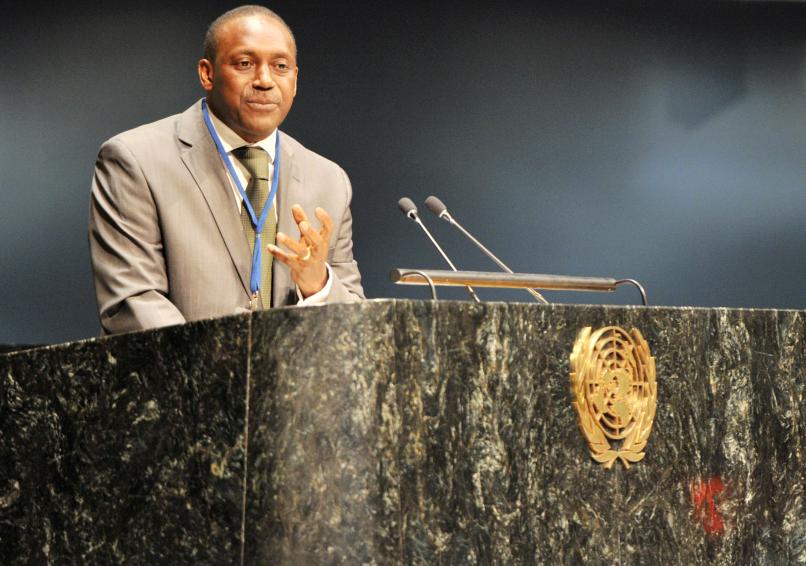History
Our journey towards Sustainable Energy for All
In September 2011, then UN Secretary-General Ban Ki-moon announced at the UN General Assembly a new initiative called on Sustainable Energy for All. This was in the context of a resolution that declared 2012 the International Year of Sustainable Energy for All, sending a clear signal about the centrality of energy in ending poverty and addressing climate change.
As part of the initiative, the Secretary-General called for action around 3 objectives to be achieved by 2030: ensure universal access to modern energy services; double the rate of improvement of energy efficiency; double the share of renewable energy in the global energy mix.
To advance substantive work on the initiative, in 2012 the Secretary-General announced Kandeh Yumkella as his Special Representative for Sustainable Energy for All and the first CEO of the initiative.
As the initiative continued to grow and evolve, additional governance mechanisms were established, including an advisory board co-chaired by the Secretary-General and World Bank President Jim Yong Kim. An executive committee was also established for operational guidance, headed up by Bank of America’s then Chairman Chad Holliday.

Early activities
In these early years, the UN Sustainable Energy for All initiative (SE4ALL) developed and implemented several High-Impact Opportunities in collaboration with its global network of partners.
Recognizing the importance of accountability and transparency to track progress toward the initiative’s three objectives, a multi-agency effort established the Global Tracking Framework (GTF) to provide baseline energy data and regular updates. The first GTF report was published in 2013, highlighting that a business-as-usual approach would not be sufficient to meet the 2030 objectives. Now an annual report and renamed Tracking SDG7: The Energy Progress Report, this global dashboard on progress continues to guide our work.
The inaugural Sustainable Energy for All Forum was held in 2014 in New York City. More than 1,000 leaders from civil society, the private sector and government convened over three days for interactive sessions intended to shape the direction of global energy policy. The Forum continues to be a flagship event for us, with each iteration delivering greater participation and reach.
The early work of SE4ALL as a UN initiative was instrumental in ensuring energy was at the heart of the 17 Sustainable Development Goals (SDGs) that were adopted by UN members in 2015. SDG7 is to ensure access to affordable, reliable, sustainable and modern energy for all, and the three initial objectives of SE4ALL were adopted as the targets for this global goal.
An evolving structure
In 2015, the SE4ALL Executive Committee named Rachel Kyte as the new CEO and the UN Secretary-General appointed her as his Special Representative for Sustainable Energy for All. She was tasked with overseeing a significant shift in governance and mandate.
Under Rachel Kyte’s leadership, the initiative became Sustainable Energy for All (SEforALL), which was established as a Quasi-International Organization under Austrian law in 2016 and headquartered in Vienna with a satellite office in Washington, DC, United States. While this new structure gave SEforALL independence from the UN, close ties were maintained through a relationship agreement.
A Board was established as the new governing body for SEforALL, replacing the Executive Committee but retaining four members. The Advisory Board to former Secretary-General Ban Ki-moon was discontinued at the end of his term of office in December 2016.
Expanding the SEforALL Platform
World leaders had just agreed on the 17 SDGs as well as the Paris Agreement, both underpinned by the pledge that we leave no one behind in the energy transition. These historic agreements were a catalyst for rethinking the role of SEforALL and how to best ensure progress towards the goals.
Following extensive consultations with the Administrative Board and other constituencies, SEforALL’s 5-year Strategic Framework for Results was adopted in June 2016, built around SDG7 and the Paris Agreement. An annual work plan prioritizes those areas where progress is needed most to achieve universal access to sustainable energy. These include mobilizing finance, gender issues, electrification, and cooling, among others. Much of this work targets high-impact countries where the energy access gaps are the greatest.

The final decade to achieve SDG7
In October 2019, Damilola Ogunbiyi, former Managing Director of the Nigerian Rural Electrification Agency (REA), has been selected as the organization’s new CEO. The news followed UN Secretary-General António Guterres announcing the appointment of Ogunbiyi as his Special Representative for Sustainable Energy for All and Co-Chair of UN-Energy.
With the world not on track to achieve SDG7 by 2030, and with the COVID-19 pandemic further impacting momentum, the SEforALL Business Plan 2021-2023 reoriented the organization to focus on both high-level advocacy and country-specific implementation. The business plan emphasized the importance of government engagement and collaboration with partners to drive progress.
SEforALL today
In Q3 2024, we transitioned from being a Quasi International Organization under Austrian law to becoming a UNOPS-hosted entity in response to our growing operations and expanded geographical footprint.
Today, SEforALL is a vibrant, growing organization with increasing demand for our work. We collaborate with governments and partners worldwide to end energy poverty, accelerate the deployment of renewable energy solutions, and combat climate change.
Impact under SEforALL Business Plan 2021-2023